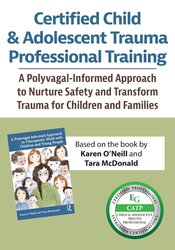
Get immediate lifetime access to this content by purchasing the digital seminar/online course instead that you can access using a variety of devices, and one CE certificate is included with purchase! Click the “Digital Seminar” or "Online Course" link below to learn more!
DVD Purchasers please note: In order to view the content, you will be required to have a DVD player or a DVD drive on your computer. Your CE is a separate fee.

Children who have experienced trauma often display behaviors that seem puzzling or self-defeating, distancing themselves from those who genuinely want to help.
They may even try to distance themselves from you
It’s easy to get stuck in a frustrating back-and-forth where you’re encouraging the very vulnerability that your client finds terrifying.
To truly support traumatized young clients, you need specialized and effective tools and strategies that go beyond words …
… to address the body’s autonomic response to perceived threat and concrete techniques that foster safety and co-regulation.
Watch Karen O’Neill and Tara McDonald. child psychotherapists and co-authors of A Polyvagal Informed Approach to Therapeutic Work with Children and Young People for this one-of-a-kind, highly experiential workshop to gain the skills you need to soothe the nervous system, nurture relationships, and foster resilience in children and adolescents who have experienced trauma.
Key Takeaways:
Whether you are new to working with traumatized children or having been practicing for many years, this course provides a fresh lens and a Polyvagal-informed toolkit to truly connect with and support your young clients who are suffering.
Don’t miss this opportunity to make a profound impact - purchase today!
CERTIFICATION MADE SIMPLE!
Attendees will receive documentation of CATP designation from Evergreen Certifications 4 to 6 weeks following the program.
*Professional standards apply. Visit for professional requirements .
Planning Committee Disclosure - No relevant relationships
All members of the –°ÚÚÚΩ ”∆µ. planning committee have provided disclosures of financial relationships with ineligible organizations and any relevant non-financial relationships prior to planning content for this activity. None of the committee members had relevant financial relationships with ineligible companies or other potentially biasing relationships to disclose to learners. For speaker disclosures, please see the faculty biography.
Continuing education credit information is coming soon for this non-interactive self-study package.
CE hours may be available for select professions, as listed in the target audience. Hours will be dependent on the actual recording time. Please check with your state licensing board or organization for specific requirements.
There may be an additional fee for CE certificates. Please contact our Customer Service at 1-800-844-8260 for more details.
**Materials that are included in this course may include interventions and modalities that are beyond the authorized practice of your profession. As a licensed professional, you are responsible for reviewing the scope of practice, including activities that are defined in law as beyond the boundaries of practice in accordance with and in compliance with your professions standards.
Karen O’Neill, MA Psychotherapist, Child Therapist, EMDR Europe Accredited Practitioner, is an adult psychotherapist, child therapist, parent-infant therapist and EMDR Europe Accredited Practitioner. She is based in the UK where she offers psychotherapy to individuals of all ages as well as clinical supervision and consultancy work. Her special interest is working with parent-child dyads to strengthen the relationship between them.
Speaker Disclosures:
Financial: Karen O'Neill is the founder and director of Counselling Solutions and the co-founder and director of PIP Solutions Training, Ltd. She receives a speaking honorarium from –°ÚÚÚΩ ”∆µ. She has no relevant financial relationships with ineligible organizations.
Non-financial: Karen O'Neill is a member of the EMDR Association UK, British Association for Counselling and Psychotherapy, and Play Therapy United Kingdom.

Tara McDonald, MA Psychotherapist, Child Therapist, Certified Clinical Trauma Practitioner, is a child therapist, adult psychotherapist and clinical supervisor based in the UK. She works with individuals of all ages through a polyvagal and attachment-focused lens. Her passion is in supporting parents and carers who might be experiencing difficulties or hurt in their journey as a parent.
Speaker Disclosures:
Financial: Tara McDonald is the Co-Founder and Director of PIP Solutions Training, LTD. and has an employment relationship with Hatch Counselling Services. She receives royalties as a published author. Tara McDonald receives a speaking honorarium from –°ÚÚÚΩ ”∆µ. She has no relevant financial relationships with ineligible organizations.
Non-financial: Tara McDonald has no relevant non-financial relationships.
Access never expires for this product.
Visit our FAQ page at www.pesi.com/faq or contact us at www.pesi.com/info
Satisfaction Guarantee
Your satisfaction is our goal and our guarantee. Concerns should be addressed to: PO Box 1000, Eau Claire, WI 54702-1000 or call 1-800-844-8260.
ADA Needs
We would be happy to accommodate your ADA needs; please call our Customer Service Department for more information at 1-800-844-8260.
–°ÚÚÚΩ ”∆µ Mobile App
Access CE trainings on your phone or tablet through our free mobile app. Choose video or audio-only versions of online courses from the world’s best instructors, and complete your CE requirements anywhere, anytime, at your own pace.
Please wait ...